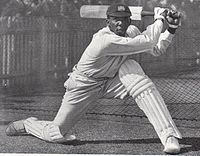Learie Constantine Cricketer
Learie Nicholas Constantine, Baron Constantine MBE (21 September 1901 – 1 July 1971) was a West Indian cricketer, who lived for many years in England, qualified as a lawyer and was later appointed Trinidad's High Commissioner to the United Kingdom. He played 18 Test matches before the Second World War and took West Indies' first wicket in Test cricket. Constantine also represented Trinidad and played professional club cricket in England for Nelson Cricket Club where he was probably the highest paid sportsman in England. Following the end of his cricket career, he became involved in fighting racial discrimination in Britain through his role as a Welfare Officer during the war. For the rest of his life, he fought against racism and was involved in at least two incidents which paved the way for the Race Relations Act in Britain. Later, he became a barrister before joining the government of Trinidad. Upon returning to England, he was initially Trinidadian High Commissioner before assuming a variety of other roles. He was knighted in 1962 and made a life peer in 1969. Born in Trinidad, Constantine established an early reputation as a promising cricketer and was selected for the West Indies 1923 tour of England. Although moderately successful, he achieved little of cricketing note in the following years. Unhappy at the lack of progress possible for black people in Trinidad, he decided to pursue a career as a professional cricketer in England. He was a great success during the West Indies' tour of England in 1928 and was awarded a professional contract with the Lancashire League club Nelson. He and his family moved to England to live in Nelson and he played for the club with great distinction between 1929 and 1938. He toured England again in 1933 and 1939, toured Australia in 1930–31 and played two further Test series in the Caribbean. While he was popular wherever he played, owing to his explosive and entertaining style, his record as a Test cricketer was less impressive than in other cricket. Nevertheless, he established a uniquely West Indian style of play. He was chosen as one of the Wisden Cricketers of the Year in 1939. When the Second World War curtailed his cricket career, Constantine worked for the Ministry of Labour and National Service as a Welfare Officer responsible for West Indians working in English factories to assist the war effort. Constantine often had to deal with racist incidents and attitudes and was awarded an MBE when his job ended in 1946. Subsequently pursuing a legal career, he qualified as a barrister in 1954 while also establishing himself as a journalist and broadcaster. He returned to Trinidad in 1954 but was soon drawn into politics. He became a founding member of the People's National Movement which won an election and became the minister of communications for Trinidad. After a successful spell in government, he did not stand in the next election, disillusioned by party politics and returned to England as Trinidad's High Commissioner between 1961 and 1964. This post ended in controversy as he became involved in a case of racial discrimination in Bristol. In his final years, he served in a number of positions in England, including joining the Race Relations Board, the Sports Council and serving as a BBC Governor. Failing health reduced his effectiveness in some of these roles and he faced criticism for becoming a part of the British Establishment. Nevertheless, in 1969 he became the first black peer when he became Baron Constantine. He died of a heart attack on 1 July 1971.
